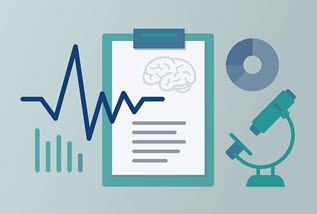
APOE Test
Detects the strongest genetic risk factor associated with late-onset Alzheimer's disease



APOE Genetic Test + FREE APOE 101 Genetic Course
$125 $85
Limited time offer. Save $40 — that’s over 30% off!
Our at-home cheek-swab test detects the presence of the APOE E4 gene, which could indicate a greater risk of developing late-onset Alzheimer’s disease and dementia.
The test includes a 20-minute follow-up APOE 101 Genetic Course with a BrainHealth Educator to discuss your test results and how lifestyle changes may prevent or delay cognitive decline.
APOE test is not available to NY or NJ residents.
What to Expect
Schedule a phone consultation with our BrainHealth Educator to discuss your test result and ways to reduce Alzheimer’s risks.
- What This Test Measures
- Why This Test Is Helpful
- Who This Test Is For
- What This Test Includes
What This Test Measures
The apolipoprotein E (APOE) test detects the presence of the APOE E4 allele, which is the strongest genetic risk factor associated with late-onset (after the age of 65) Alzheimer's disease.
Each person inherits two APOE alleles—one from each biological parent—and the combination determines their genotype.
Your results will show if you have:
- one copy of the E4 variant, which indicates 3x risk for Alzheimer's
-
two copies of the E4 variant, which indicates 8-12x risk for Alzheimer's
Why This Test Is Helpful
-
Learning your Alzheimer’s risk factors allows you to be proactive about your brain health
-
Sharing results with family gives them power over their own genetic risks and means of prevention
-
Consulting with a BrainHealth Educator about your test result and prevention goals puts you in control
-
Participating in research allows engagement with medical experts and preferred access to clinical trials
Who This Test Is For
What the Test Includes
-
All materials for sample collection and USPS return packaging
-
Detailed instructions
-
Processing at our partnered CLIA Certified Clinical Laboratory
-
Digital and printable results to share with your family and healthcare provider
-
20-minute follow-up APOE 101 Genetic Course with a BrainHealth Educator to discuss your results and how to reduce your Alzheimer's risks
Why APOE Testing Is Now Recommended
Until recently, APOE genotyping was not regularly used or recommended by most neurologists, since there was no known way to prevent the effects of Alzheimer ’s disease. However, new research indicates that cognitive decline can be delayed or even prevented with proper nutrition, sleep, exercise, and rigorous intellectual activity. Moreover, development of Alzheimer’s therapies is rapidly advancing, and some clinical trials now require APOE results to qualify.

Review Your Results with a BrainHealth Educator
Each test includes a 20-minute follow-up APOE 101 Genetic Course with a BrainHealth Educator to review your results. Our Educator can also help you identify lifestyle changes, such as nutrition, sleep, and exercise so you may improve your health and prevent cognitive decline.
%20(2000%20%C3%97%201500%20px)-1.jpg?width=300&name=Untitled%20(3000%20%C3%97%202500%20px)%20(2000%20%C3%97%201500%20px)-1.jpg)
Learn More About APOE
There are various risk factors for Alzheimer’s, but the role of genetics is becoming much more clear. The apolipoprotein E (APOE) test detects the presence of the APOE E4 gene, which is the strongest genetic risk factor for late-onset (after the age of 65) Alzheimer's disease.
There are three types of the APOE gene, called alleles: APOE E2, E3, and E4. Each person inherits two APOE alleles, one from each biological parent, and the combination determines their genotype. People with E2/E2 have the lowest overall risk for Alzheimer's and those with E4/E4 have the highest risk. The other combinations of APOE (E2/E3, E2/E4, E3/E3, and E3/E4) fall in between.
-
APOE E2 is the least common gene and may provide some protection against Alzheimer’s.
-
APOE E3 is the most common gene and is neutral, so doesn’t affect the risk of Alzheimer's.
-
APOE E4 is the risk-factor gene and increases the risk of Alzheimer's. It is also associated with getting the disease at an earlier age.* Approximately 25% of the general population carry one copy of the APOE E4 allele, while 2-3% carry two copies.
* Inheriting an APOE E4 allele does not mean that a person will definitely develop Alzheimer's. Some people with an APOE E4 allele never get the disease. Others who develop Alzheimer's do not have any APOE E4 alleles, suggesting that the APOE E4 gene affects risk but is not a cause.
Reference: Mayo Clinic
FAQs
RT-PCR test to measure DNA for the Apolipoprotein E (APOE) Genotype
Each kit contains:
-
1 set of instructions
-
1 small envelope
-
1 plastic tube with a swab inside
-
1 biohazard bag
-
1 name label sticker
-
1 FedEx Return Pak
Once you’ve sent your sample back to the lab, we’ll provide your results within 5–6 days. Your results will tell you which variant of the APOE gene you have, and whether you are at increased risk of getting Alzheimer's or dementia in your lifetime. You'll then schedule a consultation with your BrainHealth Educator to review your results with you.
Simply swab the inside of both cheeks. It's quick, shallow and painless. Be sure to ship your sample the same day you collect it. To ensure stability of the sample, we recommend you collect and ship samples Monday through Thursday only.
You'll receive a Test Guide to learn more about your results, as well as a 20-minute follow-up APOE 101 Genetic Course with a BrainHealth Educator to answer any questions and discuss potentially beneficial lifestyle changes.
We also encourage you to share your results with your physician, who can offer further guidance.
Our online portal delivers secure and confidential test results, with the highest certification standards for data security and privacy. Our platform is HIPAA-compliant, SOC 2 certified, PIPEDA-compliant, PCI-certified, and GDPR-compliant. Results will never be shared with third parties or outside sources without your consent.
Read in-depth information about APOE genotypes as they relate to dementia risk from the AGREEDementia advisory group. READ MORE
Understand how lifestyle changes can help with prevention. LEARN MORE
The laboratory services are for informational purposes only. It is not the intention of NeuroVision Imaging, Inc. and contractors to provide specific medical advice but rather to provide users with information to better understand their health. Specific medical advice including diagnosis and treatment will not be provided. Always seek the advice of a trained health professional for medical advice, diagnosis or treatment. The blood collection kit and all supplies are the property of NeuroVision Imaging, Inc. and are only to be use for the purpose of collecting the intended sample per the instructions provided.
Both the physician and the testing laboratory are independent contractors with whom NeuroVision Imaging, Inc. makes arrangements for your blood tests. Neither NeuroVision Imaging, Inc. nor contractors will be liable for any acts or omissions of the physician, the testing laboratory, or their agents or employees.










